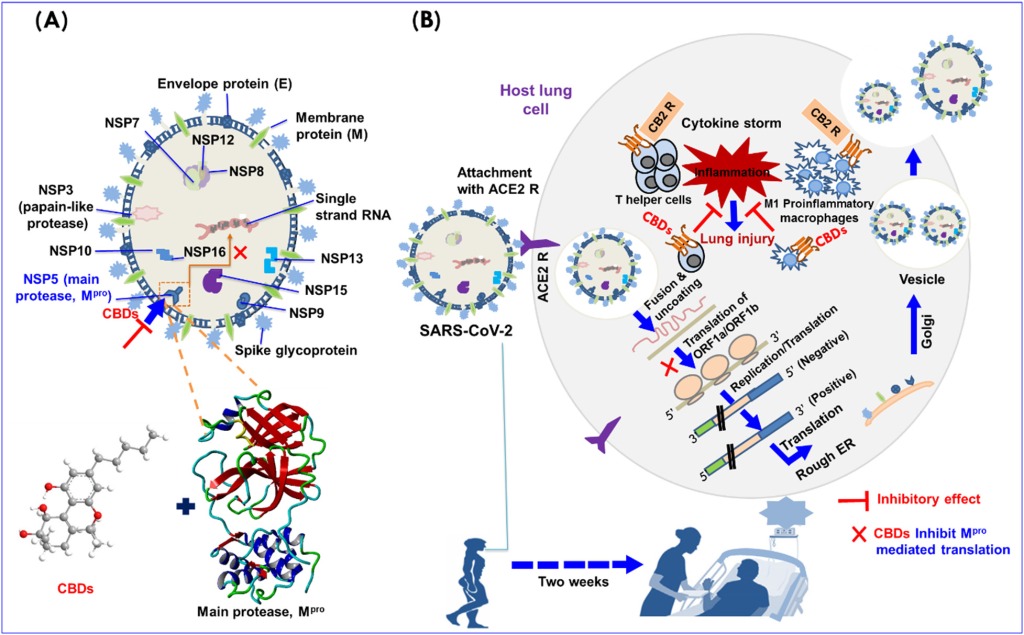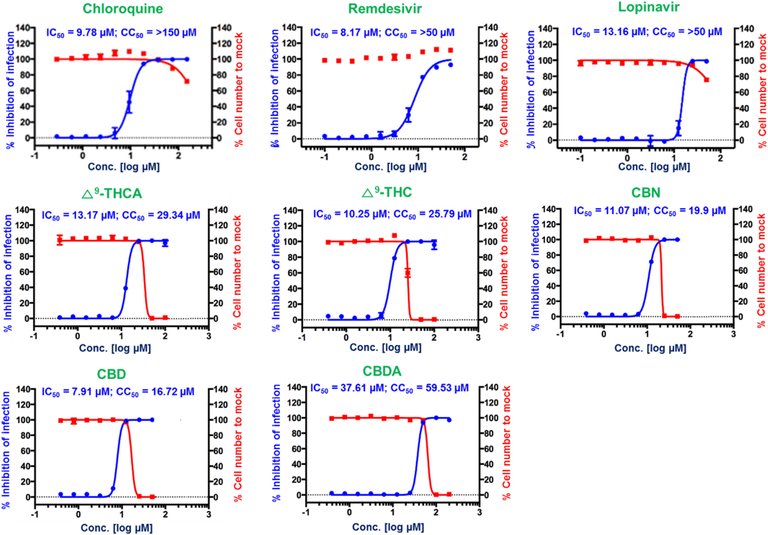Cannabis literally disabled SARS-CoV-2 virus

International Journal of Biological Macromolecules, a peer-reviewed scientific journal, published a paper from South Korean scientists showing cannabinoids including THC can neutralize the main protease of SARS-CoV-2 to block replication and control cytokine storm, suggesting cannabinoids could stop COVID19 pandemic.
Vinit Raj, Jae Gyu Park, Kiu-Hyung Cho, Pilju Choi, Taejung Kim, Jungyeob Ham, Jintae Lee, Assessment of antiviral potencies of cannabinoids against SARS-CoV-2 using computational and in vitro approaches, International Journal of Biological Macromolecules, Volume 168, 2021, Pages 474-485, ISSN 0141-8130, https://doi.org/10.1016/j.ijbiomac.2020.12.020.
Researchers from South Korea noticed cannabinoids including THC are well known antiviral agent, so they conducted computer simulations and laboratory experiments with SARS-CoV-2 virus.
(A) Cannabinoids including THC and CBD attached to the main protease of the SARS-CoV-2 virus, and disabling the proliferation function.
(B) Cannabinoids including THC and CBD attached to the receptors in the cell and regulated the immune response to stop cytokine storm.

Disabling SARS-CoV-2 virus
Through out the pandemic, many scientists came up with a solution to cope with such as vaccines, antiviral medication and more. While it is well known about such solutions, China and Germany team came out with a novel idea to inhibit the SARS-CoV-2 virus itself to disable it.
For instance, China and Germany team came out with an inhibitor model α-ketoamide 13b suggesting it could bind into the main protease of SARS-CoV-2 and disable its proliferation.
Zhang L, Lin D, Sun X, Curth U, Drosten C, Sauerhering L, Becker S, Rox K, Hilgenfeld R. Crystal structure of SARS-CoV-2 main protease provides a basis for design of improved α-ketoamide inhibitors. Science. 2020 Apr 24;368(6489):409-412. doi: 10.1126/science.abb3405. Epub 2020 Mar 20. PMID: 32198291; PMCID: PMC7164518.
Interestingly, researchers from South Korea found that THC was better and effective than the inhibitor model α-ketoamide 13b suggested by the China and Germany team.

In addition, THC and CBD were significantly stronger or similar than the reference drugs for COVID19, Remdesivir, Chloroquine, and Lopinavir through the test of measuring the half-impact concentration (EC50 or IC50), which is the concentration value of the drug that eliminates 50% of the virus.

Stopping Cytokine Storm
Most people who contact SARS-CoV-2 virus do not show COVID19 symptoms, which is severe cough, runny nose, breath difficulties. However SARS-CoV-2 virus could affect immunocompromised people.
SARS-CoV-2 virus could trigger an excessive inflammation reaction, which is almost like a sudden runny nose(cytokine storm), and cause acute respiratory distress syndrome(ARDS), which means suddenly hard to breathe.
Researchers found cannabinoids activates the receptors and dry up excessive fluid, the excessive immune responses, which is called as cytokine storm.
Mohammed, A., F K Alghetaa, H., Miranda, K., Wilson, K., P Singh, N., Cai, G., Putluri, N., Nagarkatti, P., & Nagarkatti, M. (2020). Δ9-Tetrahydrocannabinol Prevents Mortality from Acute Respiratory Distress Syndrome through the Induction of Apoptosis in Immune Cells, Leading to Cytokine Storm Suppression. International journal of molecular sciences, 21(17), 6244. https://doi.org/10.3390/ijms21176244
Scientists discovered THC treatment significantly suppressed the inflammatory cytokines, and led 100% survival of mice induced acute respiratory distress syndrome(ARDS).
Cannabis and its therapeutic value
Cannabis, known only as a hallucinogen or drug, is undergoing significant changes in its status, such as being recognized for its medical effects in the United Nations.
That means that international treatments such as anti-cancer drugs have been recognized.
Unfortunately, People’s Republic of China voted ‘no’ in this vote, however, I believe Hong Kong Special Administrative Region (HK SAR) can have a different perspective of medical cannabis.
As my sponsor Daily HongKong pointed out, People’s Republic of China can show the world that she is keeping up her promise of ‘One Country Two System’ by acknowledging different perspective of medical use of cannabis and legalize it in a aging society Hong Kong.
I hope in 2021, people could acknowledge the medical effects of the marijuana THC, including the anti-cancer effect, and proceed with legalization and non-criminalization.
Please forward this news to your friends, and I wish we could be free from masks in 2021!
[…] fact, South Korean researchers have also reported that tetrahydrocannabinol(THC) disables SARS-CoV-2 virus, and it was shown to be even better than the optimal Mpro inhibitor model α-ketoamide 13b […]
LikeLike
[…] Cbd e il Thc sono efficaci per il trattamento del Coronavirus. Questo è ciò che riporta uno studio scientifico coreano pubblicato sull’International Journal of Biologicacl […]
LikeLike
[…] This study shows that THC in marijuana may be able to treat deadly COVID complication. […]
LikeLike
[…] To assess whether CBD might be preventing viral protein processing by the viral proteases Mpro or PLpro, we assayed their activity in vitro. CBD did not affect the activity of either protease, raising the possibility that CBD targets host cell processes. […]
LikeLike
[…] Korean scientists also suggested cannabis could stop COVID19 pandemic. They found THC bind to the main protease of SARS-CoV-2 virus and disabling it to replicate. […]
LikeLike
[…] However present science shows how wrong we have known about cannabis. Like a Déjà vu back in Philadelphia, cannabis smoke can stop COVID-19 pandemic. […]
LikeLike
[…] Reference: South Korean scientists finds THC stop SARS-CoV-2 replication and cytokine storm […]
LikeLike
[…] More to read: South Korean scientists finds THC stop SARS-CoV-2 replication and cytokine storm […]
LikeLike